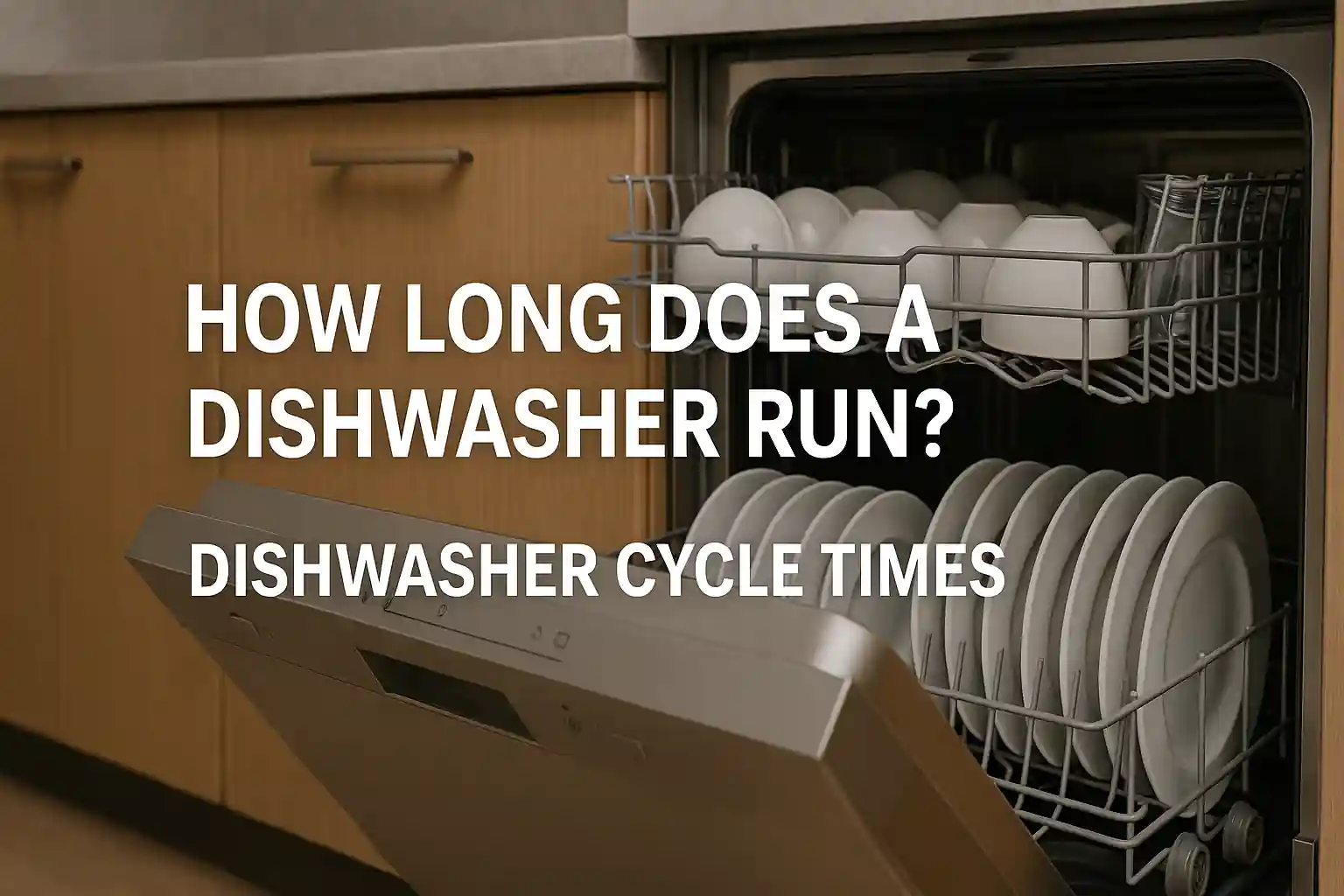How Long Does a Dishwasher Run?
When people purchase or use a dishwasher for the first time, one of the most common questions they ask is: how long does a dishwasher run? The dishwasher run time can seem surprisingly long, especially compared to older models, and many dishwashers today offer multiple wash cycles that vary in length. Depending on the dishwasher cycle you choose, the soil level of dirty dishes, the appliance brand, and the water temperature, the run time can range anywhere from 1.5 to 4 hours.
This guide provides a detailed breakdown of dishwasher cycle time, what influences how long a dishwasher takes, why modern dishwashers may run longer, and how to choose the right dishwasher cycle for your needs. We will also look at differences between quick wash, normal wash, heavy-duty wash, and other specialized cycles. By the end, you will know how to compare run times, understand why cycles take longer in modern appliances, and find the best time to run your dishwasher.
Dishwasher Basics
A dishwasher is an appliance designed to clean and sanitize dirty dishes using a combination of water, detergent, and heat. Unlike handwashing, dishwashers use less water while still achieving effective cleaning. Today’s dishwashers are built to save water and energy, which is one reason why dishwasher run time can be longer compared to older models.
How a Dishwasher Works
-
Filling Phase – The appliance fills with water, which is heated to the right temp.
-
Wash Cycle – Water jets spray detergent on dirty dishes, pans, and pots and pans.
-
Rinse Cycle – Fresh water removes detergent and food residue.
-
Dry Cycles – Heated air or condensation drying evaporates moisture.
Each of these cycle phases adds to the dishwasher cycle time.
Dishwasher Cycle Time
Cycle time is one of the most important factors in understanding how long does a dishwasher run. Dishwasher cycle time refers to the total run time a dishwasher takes from the start of a wash cycle to the end of the dry cycles.
Average Dishwasher Cycle Time
The average dishwasher run time is between 1.5 to 4 hours, depending on the cycle you choose and how dirty your dishes are. A quick wash cycle may finish in as little as 1.5 hours, while a heavy-duty or pots and pans cycle may take closer to 3 to 4 hours.
Why Dishwasher Cycles Take Longer Today
Many dishwashers today are designed to use less water and energy. Because modern dishwashers use less water, they often compensate by running longer to ensure the dishes are thoroughly cleaned and sanitized. This results in longer cycle times compared to older models.
Dishwasher Cycle Options
Not all dishwasher cycles are created equal. The cycle you choose has a direct impact on dishwasher run time.
Quick Wash Cycle
-
Run Time: About 1.5 to 2 hours
-
Best For: Lightly soiled dishes that do not require heavy scrubbing
-
Advantages: Saves time and gets dishes done quickly
-
Drawbacks: May use more water and energy per minute compared to longer cycles
Normal Wash Cycle
-
Run Time: 2 to 2.5 hours
-
Best For: Everyday loads of dirty dishes, pans, and utensils
-
Typical in: Whirlpool, KitchenAid, Bosch, GE dishwasher, and Samsung dishwasher models
-
Notes: Normal cycle balances water temperature, soil level, and drying
Heavy Duty or Pots and Pans Cycle
-
Run Time: 2.5 to 4 hours
-
Best For: Heavily soiled pans, pots, and baked-on food
-
Details: May run longer due to extra rinse cycle phases and higher water temperature
Rinse Cycle
-
Run Time: 15–30 minutes
-
Purpose: Quickly rinses dirty dishes if you plan to run a full cycle later
-
Water Use: Very little water and energy
Dry Cycles
Dry cycles can add 20–40 minutes to total dishwasher run time, depending on whether the appliance uses heated dry or condensation dry.
Run Time Factors
Several variables can affect how long a dishwasher takes:
1. Water Temperature
If the incoming water is not hot enough, the dishwasher may heat it internally, which extends cycle time.
2. Soil Level
Heavy soil levels on dirty dishes or pans require longer wash cycle phases.
3. Appliance Brand
Different brands like Bosch dishwasher, GE dishwasher, Samsung dishwasher, Whirlpool, and KitchenAid may have varying dishwasher cycle times, even for the same wash cycle.
4. Older Models vs. New Dishwasher
-
Older models: Shorter run times but used more water and energy.
-
Newer dishwashers: Longer run times but more efficient.
5. Select Models with Specialized Cycles
Some select models offer eco, sanitize, or express cycles that change run time significantly.
Dishwasher Run Time: Time Comparison
It helps to compare the run times of common dishwasher cycles:
| Dishwasher Cycle | Typical Run Time | Notes |
|---|---|---|
| Quick Wash | 1.5 to 2 hours | Best for lightly soiled dishes |
| Normal Wash Cycle | 2 to 2.5 hours | Average dishwasher run time |
| Heavy Duty / Pots and Pans | 2.5 to 4 hours | May run longer for tough food |
| Rinse Cycle | 15–30 minutes | Pre-rinse, not a full cycle |
| Full Cycle with Dry | 2.5 to 4 hours | Includes wash, rinse, and dry phases |
This shows that the time can vary depending on the cycle you choose.
Cycle Phases in Detail
Each dishwasher cycle is divided into phases:
-
Wash Cycle Phase – Cleans using detergent and hot water.
-
Rinse Cycle Phase – Rinses away soap and residue.
-
Dry Cycle Phase – Removes moisture.
Every cycle uses different amounts of water and energy. Longer run times allow today’s dishwashers to use less water while still producing clean results.
Why Dishwashers May Run Longer
Dishwashers may run longer for several reasons:
-
Newer dishwasher models are designed for energy efficiency.
-
Soil sensors adjust dishwasher cycle time based on dirty dishes.
-
Hard water can make cycles take longer.
-
Heated dry and sanitize features extend run time.
Best Time to Run Your Dishwasher
Energy experts often recommend running your dishwasher at night or during off-peak energy hours. Not only is this the best time to run your dishwasher for saving money, but it also helps reduce demand on your home’s electrical system.
How Often Should You Run Your Dishwasher?
The answer depends on how many dishes you use:
-
Daily: If you cook meals every day.
-
Every 2–3 days: For smaller households.
-
Tip: Let it run when the appliance is full to save water and energy.
Choosing the Right Dishwasher and Cycle
When buying or using an appliance, knowing the dishwasher run time helps you choose the right dishwasher cycle. Consider:
-
Cycle you choose: Quick wash vs. normal vs. heavy duty.
-
Dishwasher cleaner: Regularly use a dishwasher cleaner to keep it efficient.
-
Modern dishwashers: Accept that cycles take longer but use less water.
Examples from Different Brands
-
Bosch Dishwasher: Known for longer cycle times (often 2.5 to 3.5 hours) but excellent efficiency.
-
GE Dishwasher: Offers multiple quick wash and normal cycle options.
-
Samsung Dishwasher: Features cycle time sensors that adjust automatically.
-
Whirlpool & KitchenAid: Commonly provide a balance between normal cycle length and efficient cleaning.
First Cycle on a New Dishwasher
The first cycle on a new dishwasher may take longer as the appliance calibrates water levels and temperature. Many dishwashers may also run longer the first time because sensors are learning.
Curious how much water your dishwasher really uses? Explore our eye-opening guide on How Much Water Does a Dishwasher Use? (Dishwasher vs Hand Washing) to see how modern dishwashers can use as little as 3–5 gallons per cycle—compared to up to 27 gallons when washing by hand—and learn smart tips to maximize your home’s water efficiency.
Conclusion: How Long Does a Dishwasher Run?
So, how long does a dishwasher run? The answer varies depending on the dishwasher cycle, the appliance brand, and the soil level of dirty dishes. On average, the dishwasher run time is 1.5 to 4 hours, with quick wash cycles taking 1.5 to 2 hours and heavy-duty cycles for pots and pans taking up to 4 hours.
While older models had shorter run times, modern dishwashers use less water and energy, which means they may run longer. Choosing the right cycle, running your dishwasher at the best time, and understanding cycle phases will help you manage dishwasher run time efficiently.
In short, every cycle is different, and the time can vary depending on what your dishwasher needs to do. The key is to let it run, trust the appliance, and enjoy the convenience of sparkling clean dishes.

